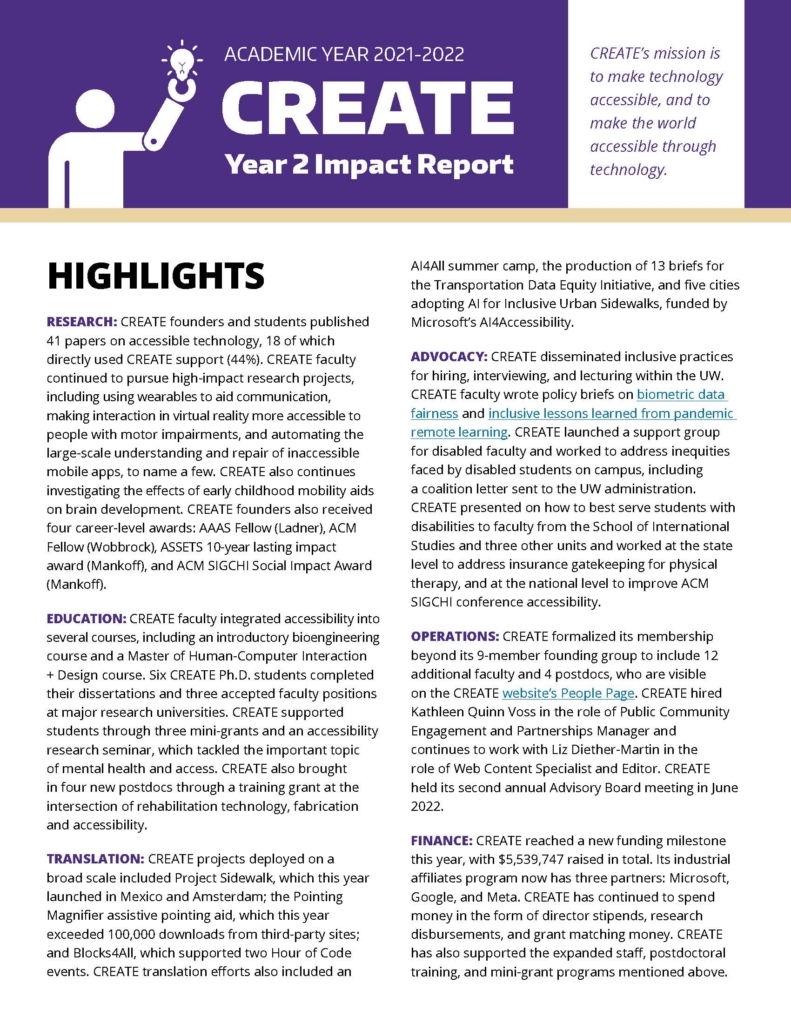
Through hard work in the field of accessible technology research, education, and translation, CREATE members are making impact together and it shows!
The Year 2 Impact Report, also available as a PDF, details much of the work CREATE has been doing in the 2021-2022 academic year.
Research
CREATE IS FIRST AND FOREMOST A CROSS-CAMPUS RESEARCH CENTER bringing together faculty, students, and postdocs, along with industry and community partners, to achieve impact through research and development of accessible technology projects. CREATE has multiple ongoing research projects that primarily focus on community living and participation through increased access to transportation, mobile/wearable apps, and physical devices (and their fabrication).
We believe in the right to equal access and participation and its importance at every life stage. Supplementing these themes are projects in a variety of additional areas, including creating accessible VR/AR experiences, creativity tools, and programming tools. Some featured projects are highlighted below.
Research articles in the report:
Featured research:
Captioning as a Group Communication ToolFeatured collaboration:
Mobile Technology and Early Childhood DevelopmentFeatured project:
Understanding Mobile App Accessibility over Time via Large-Scale AnalysisMajor research awards:
Richard Ladner, AAAS Fellow
Jacob O. Wobbrock, ACM Fellow
Jennifer Mankoff, ASSETS Paper Impact Award
Education
CREATE faculty integrated accessibility into several courses, including an introductory bioengineering course and a Master of Human-Computer Interaction +Design course. Six CREATE Ph.D. students completed their dissertations and three accepted faculty positions at major research universities. CREATE supported students through three mini-grants and an accessibility research seminar, which tackled the important topic of mental health and access. CREATE also brought in four new postdocs through a training grant at the intersection of rehabilitation technology, fabrication and accessibility.
Translation
CREATE projects deployed on a broad scale included Project Sidewalk, which this year launched in Mexico and Amsterdam; the Pointing Magnifier assistive pointing aid, which this year exceeded 100,000 downloads from third-party sites; and Blocks4All, which supported two Hour of Code events. CREATE translation efforts also included an AI4All summer camp, the production of 13 briefs for the Transportation Data Equity Initiative, and five cities adopting AI for Inclusive Urban Sidewalks, funded by Microsoft’s AI4Accessibility.
Advocacy
CREATE disseminated inclusive practices for hiring, interviewing, and lecturing within the UW. CREATE faculty wrote policy briefs on biometric data fairness and inclusive lessons learned from pandemic remote learning. CREATE launched a support group for disabled faculty and worked to address inequities faced by disabled students on campus, including a coalition letter sent to the UW administration. CREATE presented on how to best serve students with disabilities to faculty from the School of International Studies and three other units and worked at the state level to address insurance gatekeeping for physical therapy, and at the national level to improve ACM SIGCHI conference accessibility.
Operations
CREATE formalized its membership beyond its 9-member founding group to include 12 additional faculty and 4 postdocs, who are visible on the CREATE website’s People Page. CREATE hired Kathleen Quinn Voss in the role of Public Community Engagement and Partnerships Manager and continues to work with Liz Diether-Martin in the role of Web Content Specialist and Editor. CREATE held its second annual Advisory Board meeting in June 2022.
Finance
CREATE reached a new funding milestone this year, with $5,539,747 raised in total. Its industrial affiliates program now has three partners: Microsoft, Google, and Meta. CREATE has continued to spend money in the form of director stipends, research disbursements, and grant matching money. CREATE has also supported the expanded staff, postdoctoral training, and mini-grant programs mentioned above.